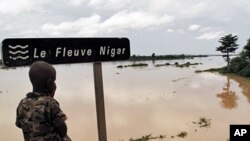Floods in Niger are compounding an already urgent food crisis in the region, as the Niger River reaches its highest level in more than 80 years.
Floods in Niger are worsening the West African country's food crisis, says the communications director for the Red Cross Society of Niger, Amadou Tidjani Adamou.
Adamou says that homes, latrines and rice fields have been destroyed in the recent flooding.
He added that the people living the area rely heavily on the rice fields that have been destroyed, and there will be consequences for the surrounding populations.
In the capital city of Niamey, the Niger River has reached its highest water level since 1929.
According to Oxfam International, a Britain-based aid group, the floods have killed at least six people and left thousands homeless.
The floods are hitting Niger at a time when more than seven million people in the country are already facing severe hunger, according to the United Nations. The heavy rains are not only washing away food reserves, but also roads that are used to deliver emergency supplies to the population, added Oxfam sources.
The World Food Program recently announced that at current funding levels, it will not be able to help feed 60 percent of those facing hunger in Niger.
Floods Heighten Food Crisis in Niger




